Reports Database
Filters
Search keyword
Topic
Report type
Country
Publish year
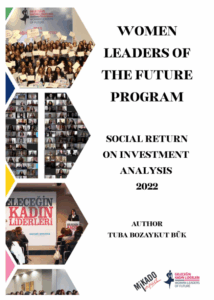
Women Leaders of the Future Program, Social Return on Investment Analysis
23/06/2025
“The Women Leaders of the Future (WLF) Program has been carried out in cooperation with Sanofi Türkiye and the Association of Women Entrepreneurs (KAGIDER) since 2011. The program aims to develop competencies and professional networks of young women who are senior university students or new graduates and to make a strong start to their careers. […]
Read more

Evaluation Report of Standard Foods Corporation’s “Grow with Love”: A Sustainability Initiative for Children’s Nutrition
20/05/2025
“The plan Grow with Love is a sustainable project aimed at supporting economically disadvantaged children. This project focuses on two key goals: improving health and well-being (SDG 3) and alleviating hunger (SDG 2). It achieves these objectives through the distribution of Food Boxes, the organization of Food Education Camps, and the development of Nutrition education […]
Read more
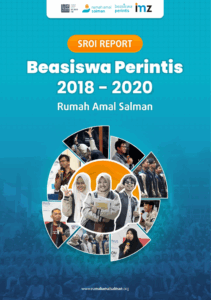
Beasiswa Perintis 2018 – 2020
29/04/2025
“This SROI report was prepared in October 2024 to January 2025. The assessment of the Perintis Scholarship program was carried out evaluatively for the period 2018-2020. The results of the discussion and exploration determined several stakeholders who were then contacted further for the qualitative data collection process. In this process, the material outcomes experienced by […]
Read more
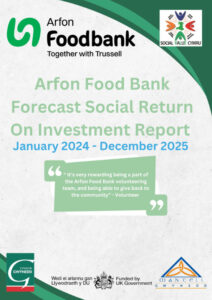
Arfon Food Bank Forecast Social Return on Investment Report
14/04/2025
“Executive Summary This report details the forecast Social Return on Investment (SROI) analysis conducted on the Volunteer Coordinator project at Arfon Food Bank and the social value created for both the volunteers and the visitors of the food bank as a result of the project between January 2024 – December 2025. The Volunteer Coordinator role […]
Read more
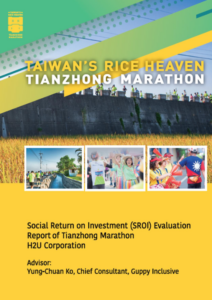
Social Return on Investment (SROI) Evaluation Report of TianZhong Marathon
24/03/2025
“The wave of road running events in Taiwan began about a decade ago, and following this trend, the TianZhong Marathon was established around the same time. By its third year, it had grown to a ten-thousand-participant event and has remained a highly anticipated marathon, attracting over 30,000 registrants annually. It is one of Taiwan’s four […]
Read more
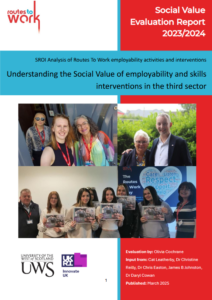
Routes To Work – Understanding the Social Value of employability and skills interventions in the third sector
24/03/2025
“This evaluation report focuses on the employability interventions of Routes To Work (RTW), an employability organisation based in North Lanarkshire, providing services to a range of areas in the West of Scotland. The report builds on a forecast report that was undertaken in 2022 and assured by Social Value UK. RTW provides clients with a […]
Read more
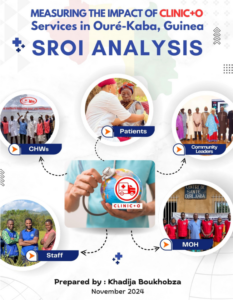
Measuring the Impact of Clinic+O Services in Ouré-Kaba, Guinea – SROI Analysis
19/02/2025
“Executive Summary Clinic+O is dedicated to transforming lives in marginalized communities by providing accessible, affordable health services. To better understand the impact of its services and drive ongoing improvement, accountability, and transparency, Clinic+O has undertaken this Social Return on Investment (SROI) analysis. The study focuses on assessing the social value generated by Clinic+O’s programs in […]
Read more
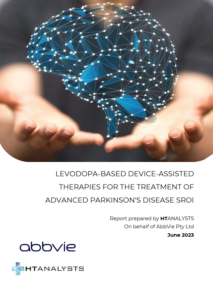
Levodopa-Based Device-Assisted Therapies for the Treatment of Advanced Parkinson’s Disease SROI
13/11/2024
“EXECUTIVE SUMMARY This project is a forecast Social Return on Investment (SROI) analysis, aimed at predicting the societal impacts that could be achieved if we invested in access to levodopa-based device-assisted therapies (DATs) for people living with advanced Parkinson’s disease (aPD). The focus of this analysis are people living with aPD who reside in the […]
Read more

The Social Value of the OnSide Network of Youth Zones
13/11/2024
“OnSide commissioned this Social Return on Investment study to further their understanding of the social value generated by the OnSide Network of Youth Zones. Social value is defined by Social Value International as “the importance people place on different aspects of their wellbeing and the changes they experience in these aspects of wellbeing.” Measuring social […]
Read more

Seeding Hope • Greening Sustainability – A Social Return on Investment Study for the Wanli District’s Coastal Reforestation
03/11/2024
“The Wanli Coastal Reforestation Project’s reforestation and afforestation activities are integral to restoring the ecological balance and protecting the coastline. Conducted by the dedicated teams from TOAF and their business partners, such as Zen Zhou Co., these activities involve strategic planning and execution to ensure the successful establishment of coastal forests. The efforts begin with […]
Read more
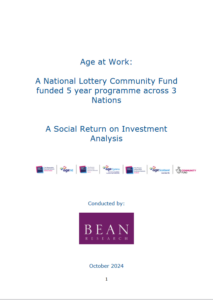
Age at Work: A National Lottery Community Fund funded 5 year programme across 3 Nations – A Social Return on Investment Analysis
31/10/2024
“Executive Summary This research was commissioned by the Age at Work programme, run in Northern Ireland, Scotland and Wales over five years, supported by the National Lottery Community Fund, and conducted by Bean Research. It focuses on how the programme created social value through supporting older workers and Employers in each nation, and what its […]
Read more

Etkiyap Forecast Social Return on Investment Report
15/08/2024
“This document has been crafted as a ‘forecast’ report for measuring the social impact of Etkiyap, covering its activities from its establishment (mid-2020) until the second half of 2023. To address the query, “What value has Etkiyap created for its stakeholders?”, the SROI framework has been chosen and employed, which embraces a wider spectrum of […]
Read more

Report on Social Value created by Offploy in 2023
30/05/2024
“This research was commissioned by Offploy CIC and conducted by Bean Research. It forms part of a project to understand how the organisation creates social value, what its social return on investment is, and the development of a toolkit to support the wider rehabilitation sector in measuring and reporting the difference it makes. Offploy supports […]
Read more
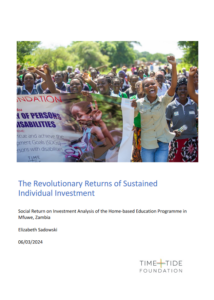
The Revolutionary Returns of Sustained Individual Investment – Social Return on Investment Analysis of the Home-based Education Programme in Mfuwe, Zambia
13/03/2024
“The Home-based Education Programme (HBEP) was introduced to Mfuwe, Zambia by the Time + Tide Foundation (TTF) in 2016 as an intervention to help children with developmental differences, none of whom were receiving adequate support. The model of the programme is to recruit and train compassionate members of the Kakumbi and Mnkhanya Chiefdoms of Mfuwe […]
Read more

Turkish Red Crescent Society Soup Kitchens SROI Report
11/03/2024
“Turkish Red Crescent Society (TRCS) has been a major contributor to the operation of soup kitchens and food aid programs in Türkiye. In 2022, an average of 42,300 people benefited from 33 TRCS soup kitchens and 12,605,506 plates of meals were distributed in total (TRCS Annual Activity Report, 2022). While measuring the impact of the […]
Read more
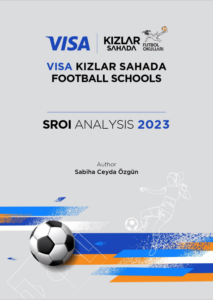
VISA-Kızlar Sahada Football Schools SROI Analysis 2023
06/03/2024
“Kızlar Sahada (a.k.a Girls on the Field) aims to break societal gender norms that tell people what they “can’t do” and to empower girls and women of all ages through football. The impact strategy of Kızlar Sahada is to contribute Goal 5 by using football as a tool with grassroot perspective. Reducing inequalities through football […]
Read more
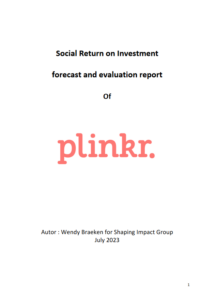
Social Return on Investment forecast report of Plinkr
21/02/2024
The solution of Plinkr Plinkr was founded in Eindhoven in 2017. The mission of this social enterprise is ‘to help every resident with financial problems towards a life free of money worries’. To this end, Plinkr developed digital solutions, in collaboration with experts, experience experts and based on thorough research in the social domain. One […]
Read more
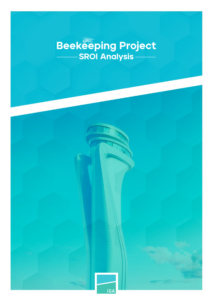
iGA’s Beekeeping Project SROI analysis
06/12/2023
“This analysis focuses on measuring the impact of iGA’s Beekeeping Project, an ongoing project that was initiated in 2022. The evaluation utilizes the Social Return on Investment (SROI) analysis as a framework, which is based on eight fundamental principles that are applied throughout the entire report. Adhering to these principles, the report provides transparent information […]
Read more
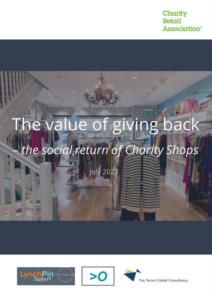
The value of giving back – the social return of Charity Shops
26/10/2023
Executive Summary The value of charity shops goes far beyond what is captured in financial terms. This Social Return on Investment (SROI) has been carried out to understand the social value of charity shops in the UK. Aligning to the International Principles of Social Value and conducted in accordance with the Social Return on Investment […]
Read more
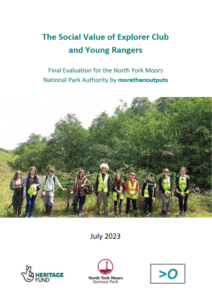
The Social Value of Explorer Cluband Young Rangers
23/10/2023
Explorer Club and Young Rangers have significantly increased the environmental awareness and responsibility of participants. Young people are more resilient, and families are stronger. When this impact is extended to households who have barriers to accessing activities like these, the value is increased. The average value per person for lottery funded cohorts is higher than […]
Read more
